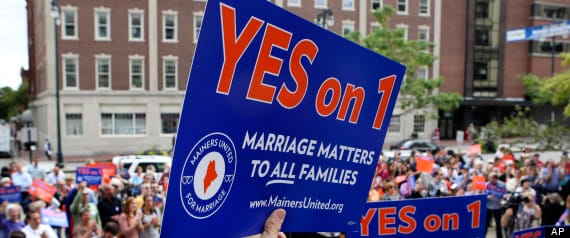Same-Sex Marriage Legal in Maryland, Maine, Washington, Minnesota


While America voted for president, states across the nation voted on social issues, with same-sex marriage on the ballot in Maryland, Maine, Washington, and Minnesota. While widely ignored by the presidential candidates, America displayed a broad acceptance for previously rejected social issues in Tuesday's election, with all four states making history as same-sex marriage laws passed in three states, and an amendment defining marriage in heterosexual terms failed in Minnesota.
In Maryland, voters passed Question 6, approving the Civil Marriage Protection Act that made it legal for same-sex couples to marry. Prior to this election, proponents of same-sex marriage had been defeated 32 times, highlighting the state's unwillingness to accept the act.
Tonight's victory comes after President Obama's open endorsement of same-sex marriage, marking a milestone in the gay rights movement. Partly due to Obama's endorsement, much of the campaign centered around African American voters in the state:
The campaign over Question 6 in Maryland focused heavily on African American voters, who make up a larger share of the electorate than in any other state outside the Deep South and whom polls showed as more reluctant to accept gay nuptials than white voters.
Exit polls reveal that backers of same-sex marriage in Maryland also supported and voted for President Obama, helping him secure re-election. The win in Maryland could have serious implications nationwide.
“It takes away the talking points that anti-marriage activists use day in and day out: that this issue can’t win at the ballot box,” said Chad Griffin, president of the Human Rights Coalition.
Same-sex marriage was also on the ballot in Maine, Washington, and Minnesota.
In Maine, voters decided whether or not the state should issue marriage licenses to same-sex couples. As reported by the AP,
Gay marriage is legal in six states and Washington, D.C., but those laws were either enacted by lawmakers or through court rulings. In popular votes, more than 30 states had previously held elections on same-sex marriage, with all losing.
In Washington, Senate Bill 6239 passed with a margin of 52 to 48 percent. The Bill would "allow same-sex couples to marry, preserve domestic partnerships only for seniors, and preserve the right of clergy or religious organizations to refuse to perform, recognize, or accommodate any marriage ceremony."
Minnesota's Amendment 1 asked voters, "Shall the Minnesota Constitution be amended to provide that only a union of one man and one woman shall be valid or recognized as a marriage in Minnesota?" While the Amendment did not actively legalize same-sex marriage, the state voted to prevent the Constitution from defining marriage between one man and one woman, leaving room for same-sex definitions in their Constitution.
LGBT victories were also felt in the state of Wisconsin, which in a very close race, elected Tammy Baldwin as the first openly gay US Senator.



